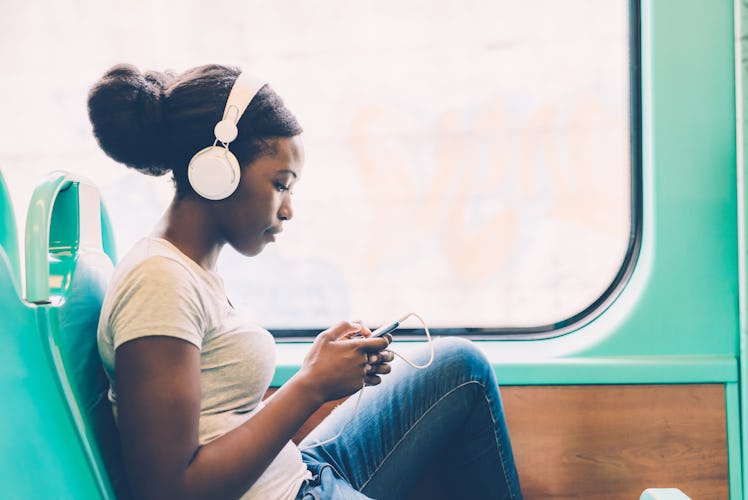
In The Mind Of A Bipolar Black Woman: 5 Misconceptions People Have About Me
Imagine being bullied by someone much bigger than you. Among one of the tactics the bully uses is the unjust, torturous act of waterboarding. The "Oxford English Dictionary" defines waterboarding as,
...an interrogation technique simulating the experience of drowning, in which a person is strapped, face up, to a board that slopes downward at the head, while large quantities of water are poured over the face into the breathing passages.
Not an ideal experience.
This is what the depressive hypomania facet of bipolar disorder feels like; the depth of your anguish is stifling and potent enough to remind you that you’re still alive through the emotional waterboarding. Again, not an ideal experience.
Much of society has a distorted view of bipolar disorder. In the spirit of keeping things real, I put together a short list of misconceptions and ideologies that plague our social landscape.
I’ve got 99 problems, but a stigma ain’t one. These fallacies can best be described as comical, irksome, condescending or “D” for all of the above:
People who consider themselves “bipolar.”
I loathe (one step further than hate because it irritates me deep in the core of my being) when people refer to themselves as bipolar in a cavalier way to describe an occasional mood swing.
Black people don’t get depressed.
I’m a black female that has suffered from bipolar disorder since I was 18 years old. I’m not playing the race card, but much of black culture views depression or bipolar disorder as something you need to “shake off” or develop a thick skin against.
Oh, if only it was that simple; I’d be Taylor-Swift-shimmying every day.
Bipolar individuals are emotionally weak.
This one is by far the most common thought. I’d like to view myself and other fellow bipolar individuals as part of the X-Men. The X-Men have a lot of strength; yet, all of them have at least one weakness emotionally or physically.
The flaw they possess does not overshadow their ability to still render a good beat down, now does it? The same rules apply to my fellow superheroes; our bipolar disorder is the weakness that complements our power.
If you take pills, you’ll be healed.
There is no cure for bipolar disorder. This perhaps is the hardest "pill" to swallow for those undergoing the cycles.
The worst part is when you’re feeling better for an extended block of time, and the next morning, you wake up either ready to paint 15 murals or jump off a bridge without a bungee cord.
Pills “help” (I use this verb very loosely) bridge the gap between stability and bipolar land, but they don't cure you.
Every emotion does not qualify as a bout of bipolar symptoms.
When you experience common emotions, your inner circle of family and friends think you’re having an “episode.” Newsflash: I’m crying during "The Lion King" because Simba’s father dies horribly. I know you cried, too, you mortal. Oh, and don’t get me started on "The Notebook."
There are triggers that cause bipolar disorder to surface in an individual, and usually something traumatic causes this to happen. This proved to be the case with me. What may traumatize one individual, may not do the same for another.
Figuratively, it’s like living through a terrible car wreck. Two individuals can experience the exact same car wreck, yet one may walk away with scrapes while the other becomes paralyzed.
I’m 28 now, but I still remember the point in which I became different 10 years ago. It was the fall after my internship at the Dolce and Gabbana headquarters. I was still on such a high because, um, Dolce and Gabbana! But that high was soon stolen by the back-to-back deaths of three cherished loved ones in my life.
Their deaths were equally untimely and unusual. Upon leaving class, I proceeded to go into a crying spell and full-blown panic attack on one of Houston’s busiest highways. I was confused, scared and sad at that moment since I never felt that way before. That was the trigger that lead to my superpowers.
Perhaps the most painful part of this lifelong journey is the disorder’s unpredictability. Rollercoasters are so much fun to be on, but at some point, the ride will end, and you’ll be back to the daily routine. Sometimes, I’m on a rollercoaster for 24 hours before I’m permitted to exit the car.
Similarly, sometimes I’m unaffected by the lack of sleep, and other times, it causes me to fall deeper down the "Alice in Wonderland" rabbit hole. While I endure insomnia, I meditate on the blessings I have and the bright future I have ahead of me.
My optimism (shocking, right?) and hope has proven to be more effective than any pills I take. Even when negativity consumes my inherent positive disposition, a beacon of hope reminds me that the nonstop rollercoaster ride won’t last forever.
I used to be embarrassed by the peaks and valleys of my emotions, but now I embrace every bit of it. I’ve learned so much about myself, and I now have more empathy for those who suffer through physical or mental ailments. I don’t view myself as a victim because such self-destructive thinking only dulls my prowess.
When I experience hypermania and feel untouchable, I take advantage of this phase to express my innate creativity more openly to the world. By the way, bipolar disorder didn’t give me my creativity; I inherited such qualities from my parents.
There are times I wish I were "normal," but then I think to myself, 'What really qualifies as normal in the 21st century?'
“Normal” is relative. Besides, there’s no fun in normality.